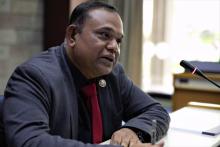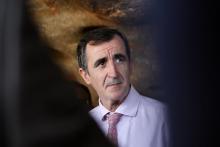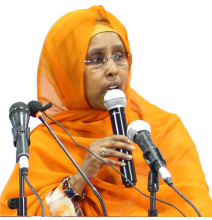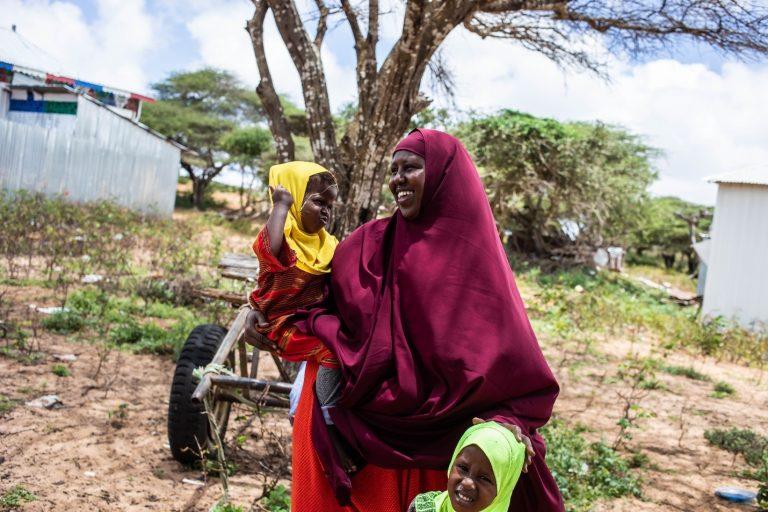In Somalia, a commitment and strategic approach to universal health coverage (UHC) has been the bedrock for a strong response to COVID-19. Its UHC Roadmap included a strategy to prepare for emergency response and recovery.
Life expectancy in Somalia is very low, and only 25% of people have access to essential health services. A strong health system and achieving UHC can transform this situation, improving people’s overall health and saving lives during emergencies.
Although Somalia is a low-income country, the Government prepared a robust response to COVID-19 to control its spread, raise people’s awareness and provide essential care to infected people.
WHO supported the government to develop a roadmap for UHC, and its emergency COVID-19 response with surveillance, case management, infection prevention and control, and strengthening laboratory capacities.

“The Government, WHO and other partners are committed to working together to make this package affordable to all Somali communities. By offering basic services in an equitable manner to all Somalis across the country, the Essential Package of Health Services will contribute to achieving universal health coverage, and will be a game-changer for the country. I personally feel that the roll out of the EPHS in Somalia is the answer to address inequity, inequality and accessibility of quality health services in the country for everyone, everywhere, leaving no one behind.”

"WHO Somalia has been a steadfast partner in responding to the COVID-19 pandemic in the country. The pandemic has highlighted the dire need for an effective primary health care system in Somalia. Together, the European Union and WHO will continue to cooperate in support of Somalia’s middle and long-term health policies now and long after the COVID-19 pandemic is over."

"The Ministry is grateful for all the timely support from its partners in preparation for and to address the COVID-19 pandemic outbreak in the country. Although this has not been a unique challenge to Somalia only, it has definitely challenged our health systems and resources. . . We are confident that through the UHC roadmap, we will be able to offer better health services to our people, and have a robust system in place to tackle future health emergencies.”
THE LONG READ
Every day, except Fridays, Beelo Botan and her team visit around 30 households in Howlwadaag village, Galkacyo, the third largest city in Somalia. They are among the many community rapid response teams set up by the Somali Government and WHO to help address COVID-19. They record and share health information, and are conscientious about wearing masks and washing their hands regularly while at work.
“Most people in Galkacyo know who we are, so they alert us as soon as someone has symptoms of COVID-19 or even polio-like symptoms. If we find someone who has COVID-19 symptoms, we locate them immediately and give them a face mask to wear and request them to stay away from their family and friends. Then, we inform the district response teams, like the District Polio Officer and District Medical Officer, to verify the case and take further action. If this case is severe, and needs further support, we transfer them to the nearest health facility/isolation centre. But if the case is mild or a moderate suspected case, we collect a sample and send it to the laboratory, while requesting them to self-isolate until they receive their result,” says Beelo.
“I really enjoy my job because I am working for my community and my messages may have benefited many people, including those who had no idea how to keep safe from COVID-19,” she added.
The first case of COVID-19 in Somalia was declared on 16 March 2020. By 9 November, Somalia had more than 4,200 cases and 107 deaths attributed to COVID-19.
The government had been making determined efforts to strengthen its health system, move towards universal health coverage (UHC) and strengthen preparedness through the development of a National Action Plan for Health Security. These efforts proved crucial when faced with the spread of COVID-19. WHO is working closely with the Somali Government to address the pandemic and deliver UHC.

Somalia’s health challenges
Somalia, with a population of 15.4 million, is a low-income country. Its economy is dependent on imports and 70% of the population is engaged in pastoralism, agriculture and the charcoal business. Just three out of ten women and five out of ten men of working age are employed.
In terms of health, the main issues facing the population are communicable diseases and respiratory infections, and issues relating to maternal and child health-related morbidities and nutrition. Average life expectancy stands at 55.7 years and only 25% of Somali people have access to essential health services. According to the International Health Regulations index, only 6% of people in Somalia are protected from health emergencies and infectious hazards.
The vast majority of Somali people therefore struggle to keep safe and healthy.
Nevertheless, the government has worked hard to respond to the crisis. Efforts to enhance preparedness and commitment to UHC have contributed to building capacity.

Preparing for emergencies in the UHC Roadmap
UHC states that everyone, everywhere should have access to the full spectrum of health services including health promotion, prevention and treatment. The start of the year 2020 has underscored that no country is safe from COVID-19 and that emergency preparedness and a strong health system are key for any response.
In 2019, the government, with support from WHO through the UHC Partnership, developed a UHC Roadmap for 2019-2023. One of the key objectives is “Ensuring that all Somali people can access the health services they need – without facing financial hardship – is key to improving the well-being of Somali people.” Somalia is benefitting from the important groundwork laid out in this roadmap, which included a strategy to prepare for responding to health emergencies in line with International Health Regulations (2005). The Ministry of Health, with WHO’s support, used this strategy to respond practically to COVID-19 in areas such as surveillance and case investigation, case management, infection prevention and control including strengthening laboratory capacities.
The UHC Partnership assists 115 countries in accelerating progress to achieve UHC through funding provided by the European Union (EU), the Grand Duchy of Luxembourg, Irish Aid, the Government of Japan, the French Ministry for Europe and Foreign Affairs, the United Kingdom – Foreign, Commonwealth & Development Office and Belgium.
“The Ministry is grateful for all the timely support from its partners in preparation for and to address the COVID-19 pandemic outbreak in the country. Although this has not been a unique challenge to Somalia only, it has definitely challenged our health systems and resources. Thanks to the strong collaboration of our international partners, World Bank Group, UN agencies, such as the WHO and all the humanitarian response efforts, we have been able to control its spread, raise awareness among the Somalis about it and provide essential care to the infected people. We are confident that through the UHC roadmap, we will be able to offer better health services to our people, and have a robust system in place to tackle future health emergencies,” said Dr Fawziya Abikar Nur, Minister of Health and Human Services of the Federal Republic of Somalia.

Essential package of health services
Alongside the UHC Roadmap, WHO supported the Ministry of Health and Human Services of Somalia to conduct a review and revision of Somalia’s Essential Package of Health Services in order to develop an improved service package so that all Somali people are able to access health care according to their needs anywhere in the country without any financial hardship. This includes a set of minimum health services for maternal, newborn and child health, communicable and non-communicable diseases, mental health, injuries and – critically – pandemic and emergency preparedness, among others.
The package is contextualized for Somali people, taking into consideration the population’s health needs. It has been developed and costed using up-to-date information on the population’s health, and social and demographic data of Somalia as well as after an in-depth analysis of the disease burden in the country.
“The Government, WHO and other partners are committed to working together to make this package affordable to all Somali communities. By offering basic services in an equitable manner to all Somalis across the country, the Essential Package of Health Services will contribute to achieving universal health coverage, and will be a game-changer for the country. I personally feel that the roll out of the EPHS in Somalia is the answer to address inequity, inequality and accessibility of quality health services in the country for everyone, everywhere, leaving no one behind,” said Dr Mamunur Malik, WHO Representative for Somalia.

Development cooperation
Development partners are working together to support the government’s response to COVID-19 and its delivery of essential health services to the population.
“WHO Somalia has been a steadfast partner in responding to the COVID-19 pandemic in the country. The pandemic has highlighted the dire need for an effective primary health care system in Somalia. Together, the European Union and WHO will continue to cooperate in support of Somalia’s middle and long-term health policies now and long after the COVID-19 pandemic is over,” said EU Ambassador to Somalia, H.E. Nicolàs Berlanga Martínez.
Contributions from WHO and the UHC Partnership have brought about a strong partnership between the EU delegation and WHO Somalia. This has evolved into a Bilateral Technical Coordination Mechanism for COVID-19 response, co-led by the EU Ambassador to Somalia and the WHO Representative to Somalia. Through this, WHO provides technical assistance and advice to EU-funded projects and activities, and risk communication and awareness-raising initiatives related to COVID-19, to ensure alignment with WHO guidance.

UHC now and for the future
Somalia is managing a strong response to COVID-19, with a UHC roadmap, an essential package of health services and international cooperation that supports the country’s priorities. Investing in UHC is helping the country protect its population from COVID-19 and future health threats, but it is also ensuring that the foundation is built so that all Somali people will have access to comprehensive quality health care without experiencing financial hardship.
